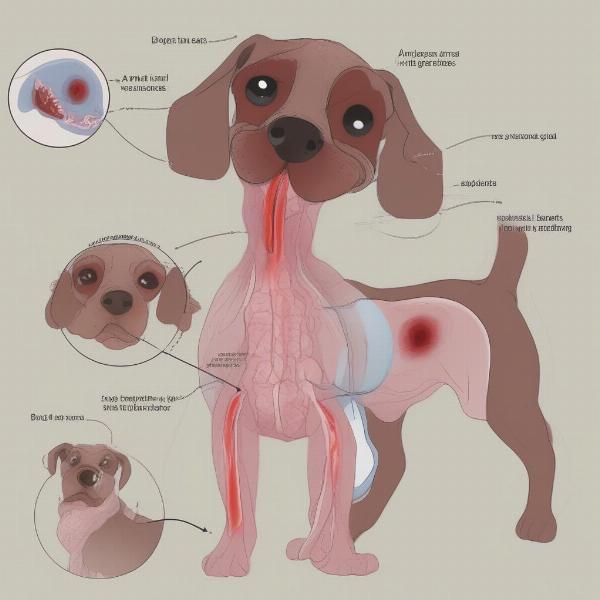Dog chewing butt, also known as scooting, is a common behavior that can range from slightly embarrassing to a sign of a serious health issue. While the sight of your furry friend dragging their rear across the carpet might make you cringe, understanding the underlying causes can help you address the problem effectively and ensure your dog’s comfort and well-being. This article will explore the various reasons why dogs engage in this behavior, from simple hygiene to more complex medical conditions, and provide you with practical solutions to help your dog stop chewing their butt.
Understanding the Causes of Butt Chewing in Dogs
There are several reasons why your dog might be engaging in this behavior. Identifying the root cause is crucial for effective treatment.
Anal Gland Issues
One of the most common culprits behind butt chewing is impacted or infected anal glands. These small sacs located on either side of the anus release a foul-smelling fluid during bowel movements. If these glands become blocked or infected, they can cause significant discomfort, leading your dog to scoot or chew in an attempt to relieve the pressure and itching.
 Dog Anal Glands Inflammation
Dog Anal Glands Inflammation
Allergies and Skin Irritations
Allergies, whether environmental or food-related, can cause itchy skin, particularly around the anal area. Fleas, mites, and other parasites can also irritate the skin, prompting your dog to chew and scratch. Even something as simple as dry skin can lead to discomfort and butt chewing.
Parasites
Intestinal parasites like tapeworms can also cause itching around the anus, making your dog chew their butt. The presence of these parasites can be confirmed through a fecal examination by your veterinarian.
Dietary Factors
Sometimes, a dog’s diet can contribute to butt chewing. Food sensitivities or a lack of fiber can lead to digestive issues and softer stools, which can irritate the anal area.
How to Stop Your Dog From Chewing Their Butt
Once you’ve identified the potential cause, you can take steps to address the issue.
Visit Your Veterinarian
The first and most crucial step is to consult your veterinarian. They can perform a thorough examination to determine the underlying cause and recommend the appropriate treatment, which may include expressing the anal glands, prescribing medication for allergies or parasites, or recommending dietary changes.
Regular Anal Gland Expression
If impacted anal glands are the problem, your veterinarian can teach you how to express them at home or recommend regular professional expression.
Dietary Adjustments
Switching to a high-fiber diet or hypoallergenic food can help improve digestion and reduce skin irritations. Consider adding bow wow dog treats that are rich in fiber.
Hygiene and Grooming
Regular bathing and grooming, especially around the anal area, can help prevent skin irritations and infections. Using a dog treat mat can help distract your dog during grooming.
Conclusion
Dog chewing butt is a common behavior with various underlying causes. By understanding these causes and consulting with your veterinarian, you can effectively address the issue and ensure your furry friend’s comfort and health. Remember, early intervention is key to preventing further complications. Addressing this issue promptly will help your dog feel better and prevent more serious health problems.
FAQ
- Why does my dog scoot his butt on the carpet? This is often a sign of anal gland issues, skin irritation, or parasites.
- How often should I express my dog’s anal glands? This depends on the individual dog. Your veterinarian can advise you on the appropriate frequency.
- Can allergies cause my dog to chew his butt? Yes, allergies can cause itchy skin, including around the anal area.
- What should I feed my dog to prevent butt chewing? A high-fiber diet can help improve digestion and reduce anal gland problems.
- Is butt chewing a serious problem? While it can be a sign of a minor issue, it can also indicate a more serious underlying condition. Consult your veterinarian.
- Can playing with toys help distract my dog from chewing his butt? Yes, providing engaging toys like a kong extreme dog toy or a dog toy frisbee can help distract them from the discomfort.
- What are some signs of impacted anal glands? Signs include scooting, excessive licking of the anal area, and a foul odor.
ILM Dog is your trusted source for comprehensive dog care information. We offer expert advice on everything from breed selection and health care to training, nutrition, and grooming. Our team is dedicated to providing dog owners worldwide with the knowledge and resources they need to provide their canine companions with the best possible care. For personalized advice or to learn more about our services, please contact us at [email protected] or call us at +44 20-3965-8624. Visit ILM Dog for more valuable insights into dog care.